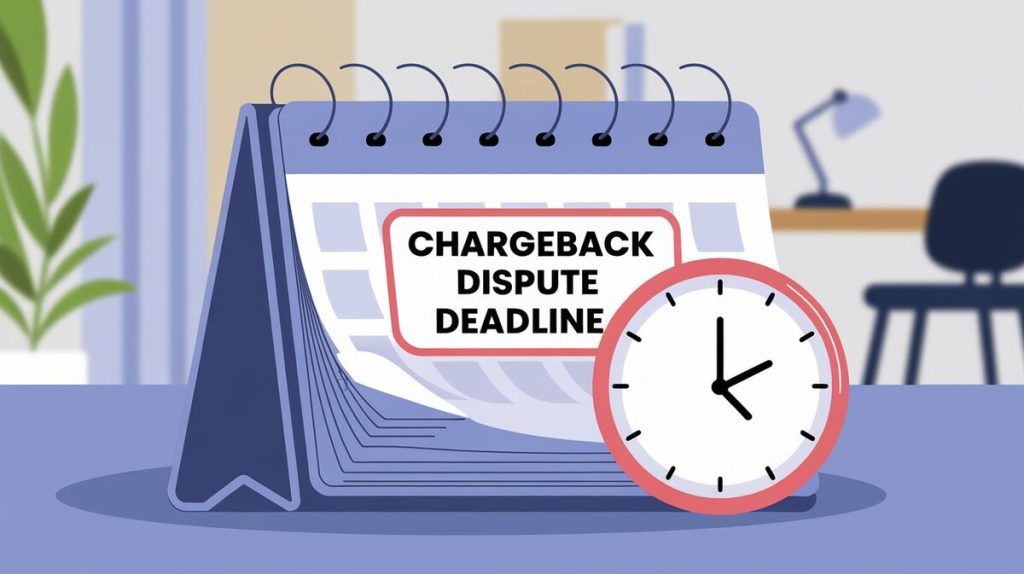Chargeback disputes occur when customers challenge a transaction and request a reversal from their bank. Understanding deadlines for filing and responding to chargebacks is critical for both merchants and consumers to avoid financial losses. This guide outlines key deadlines for major card networks and provides actionable steps to handle chargeback disputes efficiently.
1. Introduction: Importance of Chargeback Deadlines
Chargebacks enable consumers to reverse disputed transactions. These disputes come with strict deadlines set by card networks like Visa, Mastercard, American Express, and Discover. Missing these deadlines results in negative consequences for both parties, such as financial penalties or automatic acceptance of chargebacks.
For merchants, the stakes are high, as chargeback-related losses are substantial. Global chargebacks cost merchants over $100 billion annually, primarily due to missed response deadlines and poor dispute management.
2. Overview of Chargeback Deadlines
Cardholders’ Deadlines: 120 Days
Cardholders generally have 120 days from the transaction or delivery date to file a chargeback. However, certain dispute types, such as fraud or unauthorized transactions, may have shorter timeframes, ranging from 45 to 75 days.
Merchants’ Deadlines: 20 to 45 Days
Merchants have a smaller window to respond to chargebacks, usually between 20 and 45 days, depending on the card network and the stage of the dispute process. Failing to respond within this period can lead to automatic acceptance of the claim.
Table 1: Chargeback Filing and Response Deadlines by Card Network
| Card Network | Cardholder Filing Deadline | Merchant Response Deadline | Exceptions |
|---|---|---|---|
| Visa | 120 days | 20 days | 75 days for fraud cases |
| Mastercard | 120 days | 45 days | 45 days for unauthorized transactions |
| American Express | 120 days | 20 days | N/A |
| Discover | 120 days | 20 days | N/A |

3. Detailed Chargeback Deadlines by Card Network
Visa
Visa allows cardholders up to 120 days from the transaction date to file a chargeback. For certain disputes, such as fraud or unauthorized transactions, the deadline can be as short as 75 days. Merchants typically have 20 days to respond. For cases that move to arbitration, the response window narrows to 10 days.
Mastercard
Mastercard follows the 120-day rule for most disputes. For some cases, such as fraudulent or unauthorized transactions, the cardholder filing deadline is reduced to 45 days. Merchants have 45 days to respond to chargebacks, which is longer than Visa’s timeframe.
American Express
Amex provides a 120-day window for cardholders to dispute a transaction. Merchants must respond within 20 days, after which the chargeback is automatically accepted.
Discover
Discover follows the 120-day rule for cardholders, with merchants required to respond within 20 days. Discover’s policies are similar to Visa in this regard.
Table 2: Chargeback Deadline Comparison by Reason Code
| Reason Code | Visa Filing Deadline | Mastercard Filing Deadline | Amex Filing Deadline | Discover Filing Deadline |
|---|---|---|---|---|
| Fraudulent Transaction | 75 days | 120 days | 120 days | 120 days |
| Goods Not Received | 120 days | 120 days | 120 days | 120 days |
| Unauthorized Transaction | 45 days | 45 days | 120 days | 120 days |
| Duplicate Charge | 120 days | 120 days | 120 days | 120 days |

4. Factors That Impact Chargeback Deadlines
Several factors influence chargeback deadlines:
- Transaction Type: Future-dated transactions, like hotel bookings, can extend the timeline for filing disputes.
- Reason Code: Disputes over fraudulent transactions typically come with shorter deadlines (e.g., 45 to 75 days).
- Bank Policies: Some issuing banks may have more lenient or strict policies, with some extending the 120-day window to 180 days in specific cases.
5. Consequences of Missing Chargeback Deadlines
For Merchants
If merchants fail to respond within the required timeframe, the chargeback is automatically accepted, and additional costs may include:
- Loss of transaction amount.
- Chargeback fees, typically ranging from $20 to $50 per dispute.
- High-risk merchant designation, potentially leading to increased processing fees or account termination.
For Consumers
Cardholders who miss the filing deadline forfeit the right to dispute the transaction, eliminating their chance for reimbursement.
Table 3: Consequences of Missed Deadlines for Merchants and Cardholders
| Party | Consequence |
|---|---|
| Merchant | Automatic loss of dispute, chargeback fees, high-risk merchant designation |
| Cardholder | Loss of dispute rights, no refund |
| Merchant (multiple missed deadlines) | Account termination by acquiring bank |
6. Best Practices for Managing Chargeback Deadlines
1. Use Automated Tools
Merchants can reduce the risk of missing deadlines by using automated tools to track disputes. Merchanto.org, a Visa and Mastercard partner in chargeback prevention, offers tools that help merchants track disputes and respond within the required timeframe. You can learn more about their solutions at Merchanto.org.
2. Follow Card Network Guidelines
Merchants must familiarize themselves with each card network’s specific guidelines. It’s critical to:
- Respond within 20 to 45 days, based on the card network.
- Keep all transaction records and evidence ready to dispute claims effectively.
3. Maintain Clear Return Policies
A straightforward return policy can significantly reduce chargebacks. Ensuring that customers can easily return products may prevent disputes over goods not received or product dissatisfaction.
4. Stay Alert for Notifications
Many merchants miss deadlines because they don’t receive chargeback notifications in time. Merchants should ensure they receive dispute alerts promptly by working closely with their acquiring bank or using payment platforms that offer real-time notifications.
7. Conclusion
Both merchants and consumers must understand and adhere to chargeback deadlines to avoid unnecessary losses. Cardholders typically have 120 days to file disputes, while merchants must respond within 20 to 45 days, depending on the card network.
This guide provides essential information about chargeback deadlines and offers actionable steps to help merchants avoid common pitfalls. By following clear procedures and utilizing reliable tools, merchants can better manage disputes and protect their revenue.



